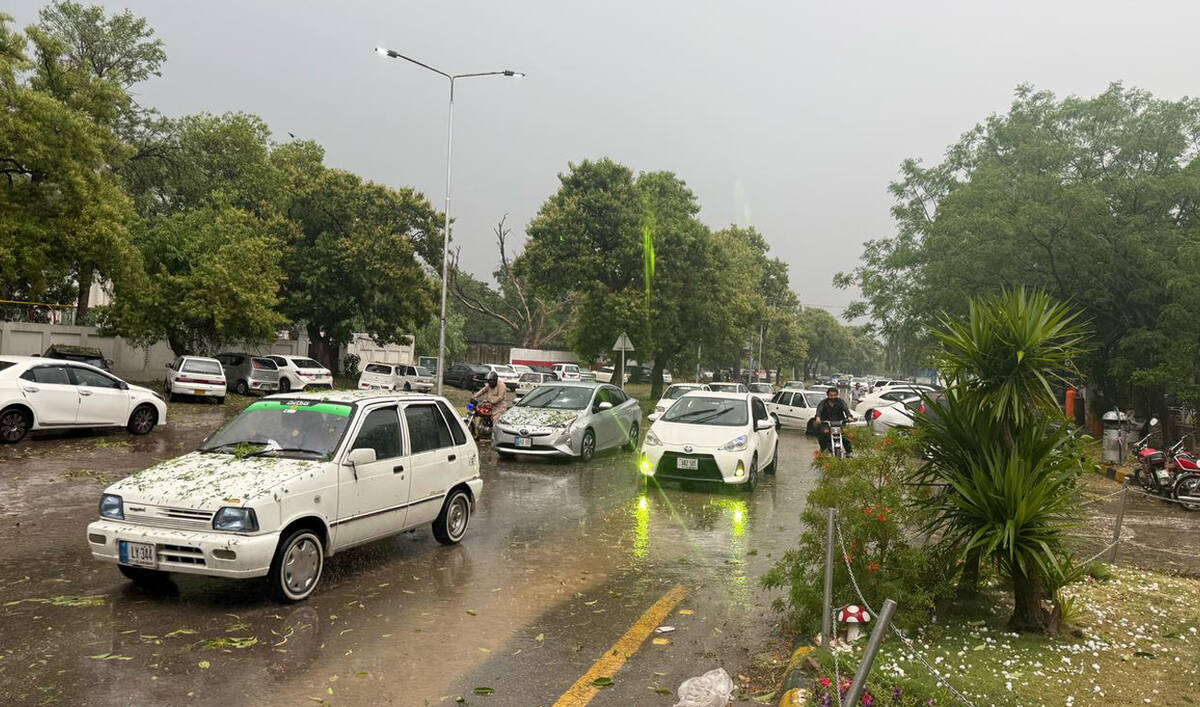KARACHI: As the country surges ahead with a financial technology (FinTech) revolution, Pakistan’s central bank said on Monday that it has launched laws for Electronic Money Institutions (EMIs) as a step toward issuing digital currency by 2025.
The regulations – which have been designed with the help of the World Bank — will also seek to cover other requirements such as outsourcing activities, anti-money laundering and counter-terror financing measures, consumer protection, complaint handling mechanism, oversight and regulatory reporting.
EMIs are non-bank entities that will be licensed by the State Bank of Pakistan (SBP) to issue e-Money for the purpose of digital payments.
On Monday, Finance Minister Asad Umar stressed on the need to safeguard financial institutions as “cybersecurity was a growing threat” and termed the launch of the electronic money institutions as a game changer in promoting e-Commerce and a digital economy in the country.
“This new category of institutions will complement the efforts of the government in creating an enabling environment to empower stakeholders in trade and commerce. This will help businesses in improving their productivity and contribute toward positioning the nation for global competition,” he said.
Officials from the SBP concurred. “These landmark regulations are a testament of the SBP’s commitment toward openness, adoption of technology and digitization of our financial system,” Jameel Ahmad, Deputy Governor of SBP, said, adding that the SBP is transforming itself into a modern, digital and technology-oriented bank.
He said that the SBP is working on issuing digital currency by 2025, with the aim to promote financial inclusion and reduce corruption, and inefficiency.
“Our currency will remain the same, but as opposed to existing online payment services — where there is the backing of any financial institution — there will be not [be any] financial institution which we are going to bring in,” Abid Qamar, spokesman of the SBP said dispelling the impression that the central bank was going to issue a cryptocurrency.
Financial experts lauded the initiative as a “landmark in FinTech space”, terming it as the most progressive measure taken by the SBP in years.
“The launch of e-Money regulations…is a key landmark in our FinTech space. This way, Fintechs have been empowered to open and manage accounts themselves. This day is going to mark the inflection point for digital payments in Pakistan. We need this sort of speed and regulatory environment to set the ground for our FinTechs to flourish,” Khurram Schehzad, a senior financial analyst and CEO of Alpha Beta Core — a financial advisory firm, said.
Meanwhile, experts said that the initiative will place Pakistan among the few nations in the world who have adopted e-Money mechanisms. “This initiative is capital intensive and would help Pakistan achieve financial inclusion, especially in the rural sector of the country,” S. M. Arif, a financial and banking technologist, told Arab News.
He added that it would also help small and medium enterprises, the farming community, and rural dwellers gain access to financial instruments. “By enabling this regulations authorities have enabled wider base of population whether Urban or Rural, to have access to finance through these new digital mode of payments from verity of players. This will require proper and frequent education of masses from issuers to make good use of such facilities and safety of these instruments” he said, before quickly adding that “the business model must be made keeping in view the local market requirements and security threats as copy pasting a foreign model may backfire”.
Pakistan to tap into digital currency potential by 2025
Pakistan to tap into digital currency potential by 2025

- Move to address cybersecurity threats faced by institutions, FM Umar says
- Launch of e-Money regulations a key landmark in FinTech space, analysts add
Intense hailstorm smashes windows, damages vehicles in Pakistan’s capital

- Islamabad district administration says assessing damages caused by hailstorm in capital city
- Met Office forecasts more rain in Islamabad, Rawalpindi, and its surrounding areas today
ISLAMABAD: An intense hailstorm and heavy rainfall battered Pakistan’s capital Islamabad and its surrounding areas on Wednesday evening, leaving several vehicles damaged and house windows smashed.
Footage on social media showed hailstones raining from the sky in Islamabad during Wednesday evening. Several Islamabad residents posted videos of their car windscreens smashed while others shared images of the windows of their houses damaged by hails.
Islamabad district administration said in a statement that its emergency teams were deployed to manage traffic and drain rainwater accumulated on the streets.
“The extent of the damage caused by the hailstorm is still being assessed,” Islamabad administration spokesperson said in a statement. “There are reports of broken windows of vehicles and houses in various areas.”

He added that rescue teams were immediately dispatched to key highways, while drainage work was already underway in several parts of the city to prevent water from accumulating on the roads.
An Islamabad resident told Arab News his car had been significantly damaged by the hailstorm.
“It would cost me around $178 (Rs50,000) to repair the windscreen, windows and side mirrors,” Ahmed Qureshi, a resident of the city’s Diplomatic Enclave, told Arab News. “My vehicle will also need to be repainted to fix the dents caused by the hailstorm.”

Several mechanic shops in Islamabad’s G-6 Markaz area were swamped with concerned citizens inquiring about the cost of new windshields.
Muhammad Ali, a mechanic, told Arab News three types of windshields were available for Toyota and Honda cars. These cost from $57-$135 (Rs16,000 to Rs38,000), adding that it takes about 20 minutes to install one.
“The windshield supplier isn’t answering his phone due to the overwhelming number of calls he has received,” he said.
The Pakistan Meteorological Department has forecast rain with thunderstorm in Islamabad, Rawalpindi, Attock and other parts of the parts of Punjab on Wednesday evening.
Iraq proposes sea link between Karachi and Basra to strengthen trade routes

- Iraqi Consul General Maher Mjhid Jejan visits Karachi Chamber of Commerce and Industry’s office to meet its leadership
- Jejan hoped Pakistani exporters, investors take advantage of Iraq’s opportunities, explore its market more actively, says KCCI
ISLAMABAD: Iraq’s Consul General Maher Mjhid Jejan has proposed a sea link between Pakistan’s southern port city of Karachi and Basra in a bid to improve logistics and strengthen trade routes, the Karachi Chamber of Commerce and Industry (KCCI) said on Wednesday.
Relations between Pakistan and Iraq have received a boost with a number of ministerial-level exchanges in recent years. The two countries have held discussions on enhancing defense and law enforcement cooperation, focusing on counterterrorism, counternarcotics and intelligence-sharing. Pakistan has attempted to strengthen trade, investment and cooperation in priority sectors with regional allies in recent months as it attempts to attract international investment to achieve sustainable economic growth.
Jejan visited the KCCI’s office on Wednesday during which he met the organization’s leadership. Talks between the two sides focused on strengthening business relations between and encouraging investment.
“He also proposed that a sea link between Basra and Karachi could play a key role in bringing the business communities of both countries closer together,” the KCCI said in a statement. “This connection could improve logistics and strengthen trade routes.”
Jejan said Iraq has introduced new investment laws designed to attract foreign investors, adding that these laws will be shared with the KCCI to help Pakistani businesses understand the opportunities available.
“He recognized the high quality of Pakistani products and expressed hope that Pakistani exporters and investors will explore the Iraqi market more actively,” the statement said.
The Iraqi consul general said his country is witnessing rapid development and offers immense potential for trade and investment. He encouraged Pakistani businessmen to visit Iraq and see first-hand the “peaceful and stable environment” in the country.
KCCI Senior Vice President Zia ul Arfeen told Jejan that Pakistan’s exports to Iraq stood at $54.29 million in FY24 while its imports from Iraq amounted to $145.46 million.
“He said that this trade volume is far below the actual potential and emphasized the need for both countries to simplify customs procedures, promote ease of doing business, and expand the range of tradable goods and services,” the KCCI said.
Arfeen said establishing an oil pipeline between Basra and Pakistan’s southwestern coastal city of Gwadar could create an important trade corridor for Iraq to access other Asian markets.
In a first, Kuwait extends oil credit facility to Pakistan for two years

- Move will help Pakistan manage energy imports, maintain foreign exchange reserves
- Pakistan petroleum minister vows to strengthen ties with Gulf states in trade and energy
ISLAMABAD: Kuwait has extended an oil credit facility to Pakistan for an additional two years, state-run media reported on Wednesday, with the development expected to help Islamabad manage its energy imports and maintain foreign exchange reserves.
The extension marks the first time that Kuwait has prolonged the credit facility for two years. The Gulf country typically grants Pakistan one-year extensions.
Expensive energy imports dominate Pakistan’s import bill. Suffering from a prolonged economic crisis for the past two years, Pakistan relies heavily on credit facilities and rollovers to maintain its foreign exchange reserve levels. In February this year, Saudi Arabia agreed to defer a $1.2 billion payment on Pakistan’s oil imports by one year.
“Kuwait has extended oil credit facility for Pakistan for another two years,” state broadcaster Radio Pakistan reported following a meeting between Kuwait’s ambassador to Pakistan and Petroleum Minister Ali Pervaiz Malik.
It said Malik thanked Kuwait for the “special concession,” adding that the facility has been extended by Kuwait Petroleum to the Pakistan State Oil.
“On the occasion, the two sides agreed to strengthen bilateral cooperation in the energy sector,” the state media said.
The Kuwaiti ambassador commended Pakistan’s significant economic progress, particularly in stabilizing the economy and improving the investment climate, Radio Pakistan said. He expressed confidence in Pakistan’s growth trajectory and reaffirmed Kuwait’s commitment to deepening economic and energy partnerships between the two nations.
Malik stressed Pakistan’s dedication to fostering stronger ties with Gulf nations, particularly in energy and trade.
Like most Gulf nations, Islamabad has cordial relations with Kuwait, which hosts around 95,000 Pakistanis. It enjoys cooperation with Kuwait at the UN, the Orgainsation of Islamic Cooperation (OIC) and other multinational forums such as the Financial Action Task Force (FATF).
Pakistan army chief vows separatist militants will not succeed in disintegrating country

- General Syed Asim Munir says military will “beat the hell out of these terrorists very soon”
- Balochistan has suffered a rise in militant attacks recently, including a train hijacking in March
ISLAMABAD: Army Chief General Syed Asim Munir recently vowed to defeat separatist militants in southwestern Pakistan for good, warning them that they would never succeed in their mission to gain independence for the country’s southwestern Balochistan province.
Balochistan has long grappled with a separatist insurgency led by groups like the banned Balochistan Liberation Army (BLA), which was designated a terrorist organization by the United States in 2019. These groups frequently attack Pakistani law enforcers and Chinese interests in the southwestern province.
Separatist militants accuse Islamabad and Pakistan’s powerful military of exploiting Balochistan and denying its locals a share in its natural resources. The army and government vehemently reject these accusations and say they are undertaking various projects in the province for its development and progress.
Speaking at an Overseas Pakistanis Convention on Tuesday, Munir addressed the recent surge in militancy in Balochistan. He pointed out that India, with its 1.3-million-strong armed forces could not “intimidate or coerce” Pakistan hence it was not possible for a small group of militants to do the same.
“Balochistan is Pakistan’s destiny,” Munir said during a passionate speech. “You 1,500 people are saying that you will take it away? Even your next ten generations cannot take it.”
The army chief praised the Pakistani fathers and mothers who readily sacrifice their sons for the sake of the country, reiterating that “Pakistan will not fall” to loud cheers and applause from the audience.
He vowed that Pakistan’s military would overcome militants in the country “very soon.”
“God willing, you will see that we will beat the hell out of these terrorists very soon,” he said.
His address comes amid a surge in attacks in Balochistan in recent months, the most prominent of which was the March train hijacking. Armed fighters of the separatist BLA stormed the Jaffar Express train in the mountainous Balochistan region last month, holding hundreds of passengers hostage.
The military launched a rescue operation in which 354 passengers were freed and 33 militants were killed. The army said that the hijacking killed 31 soldiers, staff and civilians.
Violence has persisted in the province since then, with three officials of the Balochistan Constabulary police force killed in an IED blast on Tuesday in its Mastung district.
Pakistan, China to develop aquaculture industry in Gwadar to boost seafood production, export

- Chinese port company presents plan to develop high-tech aquaculture industry in Pakistan’s coast city of Gwadar
- Developing aquaculture key to enhancing exports, ensuring food security, says Pakistan’s maritime affairs minister
KARACHI: China’s Overseas Ports Holding Company (COPHC) on Wednesday presented a detailed plan to develop a high-tech aquaculture industry in Pakistan’s coastal city of Gwadar, the maritime affairs ministry said, describing the plan as a “transformative opportunity” for the country’s coastal development.
Gwadar is in Pakistan’s impoverished southwestern province of Balochistan, a sparsely populated, mountainous, desert region where China is involved in the development of a deep-sea port on the Arabian Sea as part of a $60 billion China-Pakistan Economic Corridor.
The aquaculture industry involves the farming of aquatic organisms such as fish, shrimps, crabs, oysters, seaweed, and other marine or freshwater species. In a meeting with Pakistan’s Maritime Affairs Minister Junaid Anwar Chaudhry, COPHC Chairman Yu Bo outlined his organization’s vision to develop a sustainable, technologically advanced aquaculture sector in the port city.
“This project will harness Gwadar’s rich marine resources and transform the city into a key hub for seafood production, processing, and export,” Chaudhry was quoted as saying by the ministry. He highlighted the project’s potential to generate employment, attract investment and strengthen the local economy.
The Pakistani minister assured full government support for all investors and companies aiming to establish operations in the country toward unlocking Pakistan’s blue economy.
“We strongly support initiatives that bring investment, technology, and jobs to our coastal regions,” he said.
Chaudhry noted that Gwadar’s coastline offers immense potential for aquaculture ventures due to its favorable sea conditions and proximity to international markets. He emphasized the importance of developing hatcheries, seafood processing facilities and sustainable aquaculture farms to meet global quality standards and boost exports. The minister said developing aquaculture was key to enhancing exports and ensuring food security in Pakistan.
Both sides agreed to continue coordination through relevant government departments and technical experts to develop viable models and policy frameworks for smooth project implementation.










